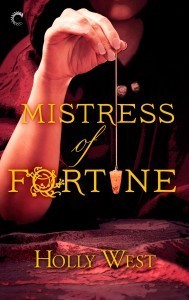Guest Post: Rules of My Writing Road
by Holly West
 My debut novel, Mistress of Fortune, is a historical mystery set in late 17th century London featuring amateur sleuth Isabel Wilde, a mistress to King Charles II who secretly makes her living as a fortuneteller. Harlequin’s Carina Press published it on February 3, 2014, which means I’ve been a bona fide author for just over a month now. A drop in the bucket, considering it took me nearly six years to write and get it published.
My debut novel, Mistress of Fortune, is a historical mystery set in late 17th century London featuring amateur sleuth Isabel Wilde, a mistress to King Charles II who secretly makes her living as a fortuneteller. Harlequin’s Carina Press published it on February 3, 2014, which means I’ve been a bona fide author for just over a month now. A drop in the bucket, considering it took me nearly six years to write and get it published.
Along the way—especially at the beginning—I read a lot of writing rules. These quick, often humorous, words of wisdom from writers far more experienced than I were helpful in those early months when I was desperate for inspiration and more importantly, motivation.
For example:
“Concentrate your narrative energy on the point of change. This is especially important for historical fiction. When your character is new to a place, or things alter around them, that’s the point to step back and fill in the details of their world. People don’t notice their everyday surroundings and daily routine, so when writers describe them it can sound as if they’re trying too hard to instruct the reader.” – Hilary Mantel
Keeping this “rule” in mind helped me to avoid the “information dump” commonly found in historical fiction. It wasn’t easy—there were so many interesting tidbits about the 17th century I wanted to include, but I knew they had to be sprinkled in carefully. My first person narrative limited me even further, because what reader wants the main character to stop in the middle of the action to explain what a chamber pot is for? Consequently, what might’ve been an entire chapter of one of my reference books might end up as a brief sentence in the actual novel or not at all.
Here’s another one that stuck with me:
“If you’re writing historical fiction, don’t have well-known real characters as your main protagonists. This will only create biographical unease in the readers and send them back to the history books. If you must write about real people, then do something post-modern and playful with them.” – Rose Tremain
For me, there was only one reason to write a novel set in 17th century London, and that reason was King Charles II. As I’ve said many times, he was my first (and possibly only) historical crush. If he wasn’t going to be a character, why bother? That said, he was never meant to be my protagonist—I preferred to live vicariously through my heroine who I always knew would be his mistress.
My philosophy in using real life historical figures is not to regurgitate the same tired characterizations we’ve seen over and over again but to recreate them from my own imagination, based upon what historical accounts have revealed them to be. Their words and most of their actions, therefore, are new to the reader, but not so out of their real life characters that they’re misrepresented on the page.
I imagine that most writers have a few writing rules that they’ve stuck to over the course of their careers. What are some of yours?
Bio:
Holly West is the author of the Mistress of Fortune series (Carina Press). The first in the series, Mistress of Fortune, was published in February 2014 and the second, Mistress of Lies, will be released in Fall 2014. She’s currently writing her third book, a stand-alone crime novel set in 1948 Philadelphia. Holly lives, reads, and writes in Los Angeles with her husband, Mick, and dog, Stella.
Mistress of Fortune Synopsis:
Isabel, Lady Wilde, a mistress to King Charles II, has a secret: she makes her living disguised as Mistress Ruby, a fortune-teller who caters to London’s elite. It’s a dangerous life among the charlatans, rogues and swindlers who lurk in the city’s dark corners, but to Isabel, the risk is worth the reward.
Until magistrate Sir Edmund Godfrey seeks Mistress Ruby’s counsel and reveals  his unwitting involvement in a plot to kill the king. When Isabel’s diary containing dangerous details of his confession is stolen, she knows she must find it before anyone connects her to Mistress Ruby. Especially after Sir Edmund’s corpse is discovered a few days later…
his unwitting involvement in a plot to kill the king. When Isabel’s diary containing dangerous details of his confession is stolen, she knows she must find it before anyone connects her to Mistress Ruby. Especially after Sir Edmund’s corpse is discovered a few days later…
Isabel is sure that whoever stole her diary is Sir Edmund’s killer—and could be part of a conspiracy that leads all the way to the throne. But as she delves deeper into the mystery, not even the king himself may be able to save her.



